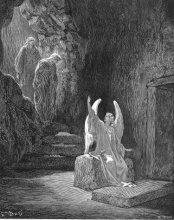Reasons for the Resurrection of Jesus Christ [1]

Below is the text of a brief talk which I gave at last year's [2] Equip [3] conference. May you be encouraged as we celebrate our Lord's love this Easter!
--
Dead men don't come back to life again. We all know this. As the American blues musician Seasick Steve sings in his The Dead Song: "No one is coming back from the dead—at least I haven't met him". Any of us would need to admit that, by our own experience, once dead, someone is not coming back. And even if we conceded that they could, they would not stay alive. According to Ravi Zacharias an inscription on a tomb in Cyprus reads: "Lazarus, Twice Dead, Friend of Jesus". While Lazarus was resuscitated, he did not stay alive, and is now a pile of bones. So how can we believe that Jesus was truly resurrected from the dead?
Firstly we need to understand that it is improbably that this story was thought up in the first century. People simply did not expect anyone to be resurrected. The Greeks and pagans believed that people would live on after death as spirits in a shadowy underworld. Hades was a place where restless, almost demented, spirits, cut off from the physical world, would mill endlessly. Jews additionally believed that people would be resurrected, but only on the Last Day of God's final judgement. We see this, for example in Ecclesiastes 9, Isaiah 38:18, Daniel 12 and Ezekiel 37. But when Jesus was resurrected, He was restored in body (not just Spiritually), and in glory as well. We see this in that He could appear and vanish suddenly, and that even though His body was wounded, it did not hinder Him. This story, to be blunt, would have been too absurd to have been believable in the first century. Jesus had returned from the shadowy underworld; He did not rise to an afterlife, He rose.
That the disciples came to a sudden and radical belief to Jesus's resurrection is undeniable. As someone once said: liars make poor martyrs. Each of the disciples suffered greatly for what they proclaimed—from the first sermon in Acts 2 onwards—that Jesus did not merely come back to life, but conquered death and is able to give everlasting life. Since the stoning of Stephen, Christians at death's door look ahead in eager anticipation of being reunited with their Lord and all their other brothers and sisters.
In your NIV Bible, if you turn to Mark 16:9, you will see this disclaimer: [The earliest manuscripts and some other ancient witnesses do not have verses 9–20.]. This does not mean that what follows is false or invalid, just that Mark did not originally include as part of his story. We may ask, why did Mark stop his story so abruptly? Does his silence betray uncertainty about the Resurrection? I don't believe so: I believe that he was clear that the Resurrection did take place and that his intention was to leave us with the question: what does the news of the Resurrection really mean? Suddenly, we are forced to go read through his book again, see that Jesus confidently predicted His resurrection, that prophecies from hundreds of years before accurately predicted it, and compels us to take all that that He had said seriously.
So now, how will you respond when you read that the young man in the robe had said to the women at the grave, "He is risen!"
Categories:
- Talks [4]
